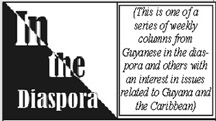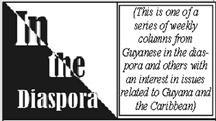The Caribbean Voice is a New York-based NGO that has been involved in social activism since its launch in 1998.
It has been repeated ad infinitum by various government ministers and other officials: stakeholders’ collaboration is critical… However, when it comes to tackling social issues, the gap between words and deeds remains unbreachable. And, to be one of the few who are embraced as ‘collaborators’, you have to be a celebrity, have political affiliations, belong to particular groups, know ‘connected’ ones…be seen as one of ‘us’ and not one of ‘them’.
In fact, many of the government’s actions negate its mantra of stakeholders’ collaboration. For example, at a recent parliamentary sitting on suicide (at which The Caribbean Voice made a presentation), a cabinet minister was quoted in the local media as referring to a 2016 National Stakeholders’ Conference on Suicide. How can a conference be national when its attendees were less than 25% of all stakeholders and many of the major stakeholders were not invited? Contrast this with a 2015 National Stakeholders’ Conference on Suicide and Related Issues organized and fully funded by The Caribbean Voice (TCV) and its partners, at which there were over 60 stakeholders and another 15 plus activists, as well as media, members of the Diplomatic Corp and Cabinet Ministers.
On the other hand most stakeholders continue to strive for real and meaningful collaboration. One significant example of stakeholders’ collaboration is the National Anti-Violence Candle Light Vigil launched last year by Voices Against Violence, a loose umbrella of over 50 organizations, to mark World Suicide Prevention Day on September 10. This event saw about 300 vigils held across Guyana.
2017 is year two for this vigil. This year’s vigil is being held under the theme for World Suicide Prevention Day: ‘Take A Minute, Save A Life’. Vigils are inexpensive and easy to organize and Voices Against Violence is urging all organizations to join hands and ensure that their communities come together to focus on suicide, all forms of abuse and other types of violence. Additionally, individuals should reach out to any organization of which they are members or that exists in their communities, and urge them to organize vigils.
This vigil is an attempt to get communities across Guyana involved in anti-violence activism, while fostering the concept of communal action for community well-being. It is hoped that this vigil will catalyze genuine togetherness and enhance the process of communities taking ownership for their safety. That process is also expected to create the environment for NGOs to collaborate with community leaders and organizations to hold community empowerment sessions and help implement anti-violence training.
For the purposes of this vigil all of the following are considered acts of violence either against self or others: trafficking in persons, suicide, drug and alcohol abuse/addiction, domestic and child abuse, rape, incest, teenage pregnancy, road carnage, dysfunctional relationships, neglect of the elderly, abuse of the mentally and physically challenged.
Violence should be addressed holistically and when communities come together they begin to communicate, connect and care as they build togetherness while getting their feet wet in the practice of mindfulness. This process is also hoped to enhance NGO/NGO/CBO/FBO collaboration, thereby enabling more impactful work, more extensively and more cost effectively within communities. In this way the help will reach where its most needed and hopefully positive changes will emerge sooner than later. Such help starts with each person taking a few minutes each day to ask someone ‘How are you?’ and then listening without judging. As this year’s vigil theme emphasizes, those few minutes can save lives.
Each organizing group has total control over its vigil. In addition to candles, cell phones can also be used. We urge that vigils start around 6PM so that they can finish for residents to get back home early enough. We also urge that all vigil organizers get in touch with either TCV (caribvoice@aol.com) or Save Abee Foundation (info@saveabee.com) or via their Facebook pages. As well, contact Annan Boodram, Sham Tilak or Nazim S. Hussain via FB…so we can log your vigil, help to provide publicity and promotion and/or provide additional info and any specific support. Or touch base with any member of any of the organizations mentioned in this article.
Last year Pastor John Joseph and the Seven Day Adventist Church organized almost 100 vigils and they were one of the first entity FBO to come on board this year. The Guyana Hindu Dharmic Sabha and the Anna Catherina Islamic Complex were also vigil participants last year and we anticipate that both will partner this year too. As well, the United Republican Party is partnering this year. Last year we wrote all the major political parties and many cabinet ministers but only got a response from Minister Khemraj Ramjattan, whose ministry publicly endorsed the vigil. This year we are inviting all other religious entities, including umbrella bodies, to become involved. Please feel free to contact TCV, Save Abee Foundation, Pastor John Joseph or anyone else associated with vigil. Incidentally as this article was being written an estimated 105 vigils were already in the works. As well vigils are being organized in Trinidad & Tobago, the US and Canada.
Meanwhile, Save Abee Foundation, in collaboration with other stakeholders, started their Annual Medical Outreaches at Black Bush Polder on July 15th and are at Imbaimadai, today, July 17th. These outreaches provide eye care, dental services, general checkups, tests for hypertension and diabetes. In addition, medications, eyeglasses and medical equipment are provided free of cost. Clothing is also distributed. The Blood Bank was at the Black Bush Polder outreach to collect donations of blood while TCV provided mental health awareness services. Shoes, food items, and personal hygiene items are being distributed at Imbaimadai
Another mechanism through which social activists are brought together is the Annual El Dorado Awards. This very successful event was launched three years ago to:
build connections between the business and professional community on the one hand and activists and advocates on the social landscape on the other hand with the hope that ongoing partnerships can be established to harness social responsibility and enhance social activism.
help foster unity across various divides and emphasize the concept of Guyanese first and foremost.
recognize and honour those who give of their time and efforts and go beyond the scope of their jobs and professions to lend a helping hand and/or work to make society better.
This year the El Dorado Awards will be on November 18th at a venue to be announced. For additional info and lists of previous honorees please log on to http://caribvoice.org/el-dorado-awards.html. We take this opportunity to sincerely apologize to this year’s honorees, who were not informed in a timely manner about the date change, as the awards were initially set for this month – July.
Meanwhile TCV and other stakeholders would like to point out that a recent statement in parliament that the reduction in suicide is due to the work of the Mental Health Unit (MHU) of the Ministry of Health is untrue. The reality is that this reduction is much more significantly due to the collaborative efforts of NGOs, FBOs and CBOs working, mostly voluntarily, on the social landscape, than to the MHU or any component of the government.
We must also point out that mention made about reaching out to families of suicide victims leaves us scratching our heads as TCV and other stakeholders, including Crossroad Suicide & Mental Health Awareness Services, and Monique’s Helping Hands, do this regularly, and we are yet to hear from such families that they were visited by reps of the MHU. But it indeed would be fabulous if the MHU can make such visits across the nation, and not selectively, as these families do urgently need counseling.
However, we are happy that the myth about East Indians being 80% of all suicides has been finally debunked. We have been saying all along that this figure is closer to 50% as the Minister pointed out. Yet we are also disappointed that governmental spokespersons at that parliamentary session on suicide made no mention of counselors in schools (promised but not yet implemented), strategies to tackle pesticide suicide, bringing back the Gatekeepers’ Program (also promised but not yet implemented); an integrated approach to health care as advocated by the World Health Organization; establishing a mechanism to support suicide survivors and families of suicide victims and sensitivity training for all health care workers, police officers and media personnel.
Meanwhile in exploring collaborative efforts TCV is always reaching out. Collaboration takes place with the five workshops that are being offered: Youth & Students, Teachers, Community Outreach, Train the Trainer and Employees Mental Health. In fact businesses have been very supportive of the work of TCV and other stakeholders. These include Imam Bacchus & Sons (Essequibo), A. Ally & Sons (Berbice), Gafoor & Sons, Galaxy Communications, Team MMR, Cara Hotel, Marriott Hotel, Prashad’s Medical & Pharmacy, Guyenterprise and Metro Office Supplies, among others.
In addition to linking with various businesses, NGOs, CBOs and FBOs, TCV has held meetings with a number of ministers and/or their reps, the University of Guyana, business organizations, various government agencies including the Childcare Protection Agency, a number of diplomats and/or their reps and many of the media houses and international organizatiosn such as the Global Mental Health Program at Columbia University (New York City) and Seva International, headquartered in Indian. Some have yielded results; some have not and some are a work in progress. We will continue this approach because we truly feel that suicide prevention and anti-abuse are everybody’s business and thus greater positive impact can only result, as more and more stakeholders join hands and hearts to tackle suicide, child abuse, sexual abuse, gender based violence alcoholism, drug use and other social ills. And so we appeal to all of you to join this fulfilling journey as we seek to save lives and empower people. Our hearts walk with each one of you.
Finally TCV suggests to the chair of the parliamentary committee on social services to convene a meeting of all activists on the social landscape to be informed about their work, get a sense of the realities on the ground and foster collaborative efforts already under way.







